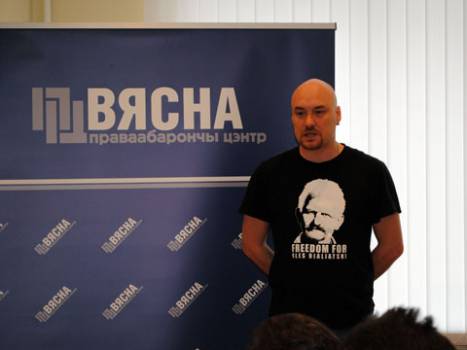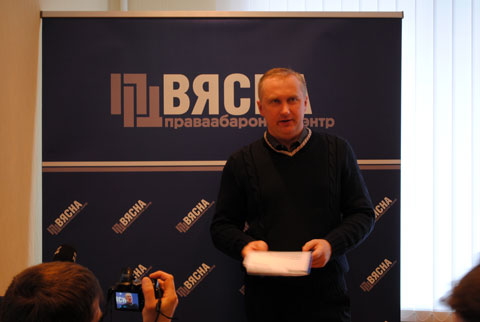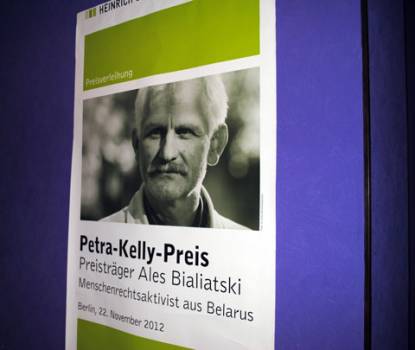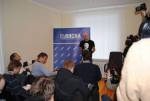Human Rights Center “Viasna” starts working in new office
On 1 April, the opening
day of the new office of the HRC “Viasna”, the human rights defenders presented
new analytical editions, shared their plans for the future and defined the
priorities for their current activities.
It was quite difficult to find a new office room after the confiscation of the
previous one. As stated by the deputy head of the Human Rights Center “Viasna”
Valiantsin Stefanovich at the press conference, taking into account the circumstances
in which “Viasna” has to work “it is desirable that the person who lends the
apartment has no business or family in Belarus. Thus, the owner of the
apartment doesn’t live in Belarus and we use it on the basis of power of
attorney with the most extensive rights and powers. That’s why I hope that we
will stay here for a long time.”
Despite the obstacles on the part of the authorities, the Human Rights Center “Viasna”
will continue all directions of its activities, emphasized Mr. Stefanovich.

“Our human rights organization is wholly legitimate and pursues legitimate
objectives. I shall note that the latest Resolution of the UN Human Rights
Council eloquently emphasized that states have not only negative undertakings
(such as non-interference with legitimate activities of human rights
organizations), but also positive ones, including the creation of favorable
conditions for the realization of the right to protect the rights and interests
of other individuals and receive finances for such activities (including foreign
financing), as far as this rights is guaranteed by the Declaration on Human
Rights Defenders. By the way, as stated in the recent decision of the UN Working
Group on Arbitrary Detentions concerning the case of the head of the Human
Rights Center “Viasna” Ales Bialiatski, this is the way freedom of association
is considered within the context of Article 22 of the International Covenant on
Civil and Political Rights. We will continue our activities keeping it in mind.”
The work of “Viasna” has continued without any break since the confiscation of
its previous office in November 2012, despite the absence of premises. The
public reception operated at the office of the movement “For Freedom” and the
Committee to Protect the Repressed “Solidarity”, whereas other human rights
defenders had some time to concentrate on analytical work. As a result, there
were published several analytical editions – yearly Review-Chronicle of Human
Rights in Belarus and a Report on the results of the monitoring of the penitentiary
institutions of the Republic of Belarus.
Monitoring of the Belarusian penitentiary system is one of the directions of
activities of “Viasna” staff who prepared their report in cooperation with
Pavel Sapelka, a lawyer with years of practice.

“First of all, we needed to inform the public about the situation in the penitentiary
institutions and make it clear that there are systemic problems in this sphere –
the problems which don’t depend on the will of those who govern the
penitentiary institutions, but arise from the very essence of our penitentiary
norms,” stated Mr. Sapelka while presenting the edition. According to the
expert, this report is just the first step and the work at this issue will
continue, all issues mentioned in the report will be subject to a wider and
deeper investigation.
In general, the human rights defenders voiced many plans for the future. Soon they
intend to file to the UN an interim analytical report on the implementation by
Belarus of its undertakings within the Universal Periodical Review. This
document is prepared by “Viasna” in cooperation with the Belarusian Helsinki Committee,
the Belarusian Association of Journalists and the Belarusian Assembly of NGOs. “Viasna”
members also intend to observe the local elections of 2014 and the presidential
elections of 2015 within the framework of the campaign “Human rights defenders
for free elections”. They will continue their daily work as well.
Summing up the results of the earlier work and defining the plans for the
future, Valiantsin Stefanovich dwelt extensively on the current situation. He
emphasized that the release of all political prisoners remained the most
important issue for “Viasna”. “Pitifully enough, 2012 didn’t bring a
breakthrough in this respect. That year, all prisoners were released after
writing clemency petitions and the process didn’t go further than that.” The
human rights defenders are of the opinion that the European Union demonstrates
a principled position when stating the release of all political prisoners as a pre-condition
for the renewal of a dialogue with Belarus. “Starting with December 2012, we
have been observing quite an active communication of representatives of the EU
embassies with the Minister of Foreign Affairs of Belarus. Of course, we are
not a party to these negotiations and hardly tell anything about these talks,”
said Mr. Stefanovich, “but the question of the release of the political
prisoners is evidently among the discussed ones. We can tell it by the statements
made by representatives of the foreign ministries of different countries – for instance
the statements of the Foreign Ministers of Italy and Lithuania in which they
expressed hope for the normalization of the relations between Belarus and EU as
a result of the release of political prisoners. However, it seems to us that
one shall have no illusions in his process. I don’t think the regime will be
able or ready to any liberal reforms or, as it often called, modernization of
the political and economical system.”
According to the estimations of the human rights defenders, at present one can
talk just about the decrease of the number of cases of politically motivated
prosecution. “However, it seems to us that there are no reasons to speak of
some greater reforms which would witness liberalization processes in the
country. The legislation has become increasingly repressive since December
2010. The problems with the realization of civil rights in Belarus remain
acute, as far as the freedom of peaceful assemblies and a number of other civil
and political liberties are utterly limited,” said Mr. Stefanovich.
He also reminded that due to the fact that the presidential election 2015 was
ahead, it was impossible to predict the development of the events in Belarus. “We
have the examples of 2008 and 2010 when everybody talked of liberalization, and
remember well enough how it all ended. This is 19 December 2010 with the
unprecedented wave of reprisals whose consequences we still feel. In our
report, prepared in cooperation with the International Federation for Human
Rights, we concentrated not only on the current political prisoners, but also
on victims of political repressions. At the moment of writing of the report,
various restrictions concerned 40 people.
I mean, those who were released in 2011 and 2012 are still on a preventive
supervision, their convictions still haven’t been cancelled, which allows the
authorities to keep them under control. Every day they are at risk of being
imprisoned again for their deeds.”
As emphasized by Mr. Stefanovich, in the present situation one can only hope
for a possible early release of political prisoners, including the head of the
HRC “Viasna” Ales Bialiatski.























